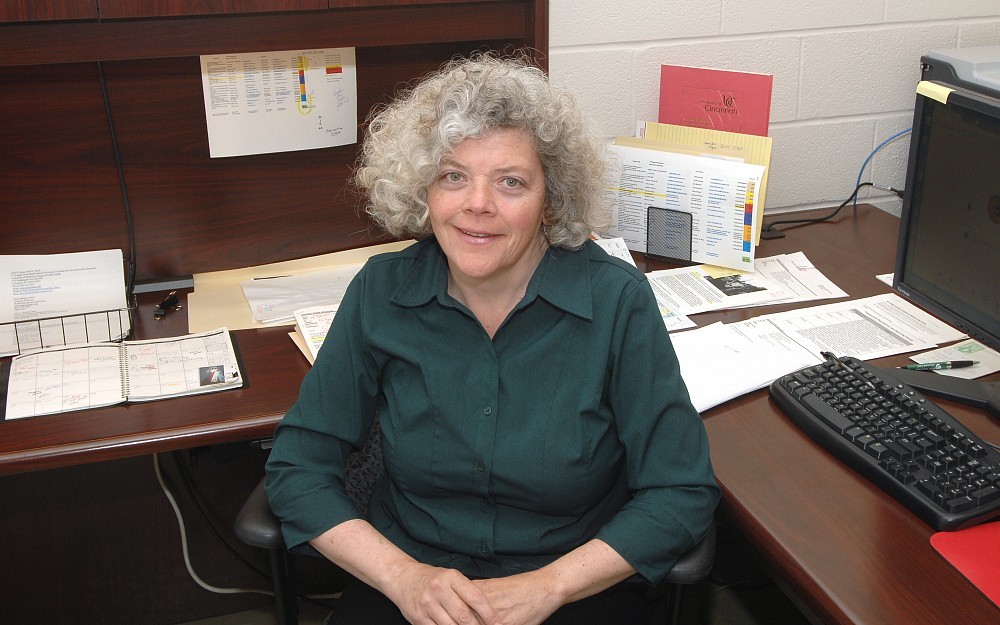
Focus on Staff With Teresa Donovan
Teresa Donovan, MPH, is a newcomer to the Department of Environmental Health, joining last month as program coordinator for the Center for Environmental Genetics (CEG). Donovan has more than 20 years of research and communications experience, with a resume that includes service on the White House staff (1988-92) in the Domestic Policy Office of then-Vice President George H.W. Bush and later as senior writer and editor of presidential messages and correspondence.
Donovan will assist Shuk-Mei Ho, PhD, Schmidlapp Professor and Chair of Environmental Health, and other faculty with day-to-day coordination of the CEG, including its Integrative Health Sciences Facility Core and Pilot project and Career Development Programs.
How long have you been at UC and what brought you here?
I joined the CEG on April 28 after eight years at the University of Kentucky and its College of Public Health. There, I worked in the CDC/NIOSH-funded Southeast Center for Agricultural Health and Injury Prevention and the Central Appalachian Regional Education and Research Center.
You were an English major in college, but two decades later earned a masters in public health administration. What sparked your interest in science and public health?
I have had a lifelong interest in family- and maternal-child health issues, since these are foundational to a strong society. This interest continued through my years of service in the federal government and solidified even further after working as a direct services provider in inner-city Boston for seven years. There, anecdotal observations regarding clients of AWC Pregnancy Health Centers galvanized my decision to pursue graduate studies in public health, where I concentrated my capstone research on the use of synthetic hormones in human reproductive medicine and livestock management. I have personally known several individuals for whom the downstream effects of diethylstilbestrol (DES), for example, were and are not a mere "hypothetical question or historical case study. Accordingly, I remain intrigued by the widespread use of reproductive steroids and their potential impact on epigenetics and our environment. Dr. Shuk-Mei Ho and the CEG are renowned for their research in gene-environment interactions and the developmental origins of health and disease (DOHaD). I am privileged to have the opportunity to serve, and to learn, in this cutting-edge research center.
What is a typical day like for you?
It is too soon in my UC career to describe any day as "typical, but thus far, I have enjoyed interacting with a diverse group of faculty members, forward-looking postdocs and trainees and some of the most professional and collegial fellow staff members I have ever met. My duties include coordination of CEG pilot funding and career development awards, assistance with grant writing and progress reporting and facilitating communication among the CEGs more than 100 full, clinical, associate and affiliate members and wider community.
What do you enjoy about your job?
Research on gene-environment interactions is an effective reminder that no living creature grows or thrives in isolation; everything is about relationship. This marvelous and mysterious "inter-connectedness, if you will, underscores the importance of good stewardshiptoward our health, that of our offspring or hoped for offspring, our neighbors and their children and the world we inhabit. Working at the center reminds me of these words from 17th-century scientist Nicolas Steno: "Beautiful is what we see. More beautiful is what we comprehend. And most beautiful of all is what we do not comprehend.
Tell us something people wouldnt expect about you.
I havent owned a television in more than 15 years (and do not miss it), engage in hand woodcarving when opportunity allows and briefly studied traditional Argentine tango in Boston. None of that "Dancing with the Stars sort of thing, however!
Aside, from work, what keeps you busy?
Jogging and swimming for fun, and a thoroughly interesting family: six brothers, three sisters, nine nieces and nephews, and ... who knows what the future holds!
Tags
Related Stories
Ohio could soon make breast cancer screenings more affordable
May 9, 2025
The University of Cincinnati Cancer Center's Ann Brown was featured in Local 12 and Cincinnati Enquirer reports on a bill introduced by Rep. Jean Schmidt in the Ohio legislature that seeks to eliminate out of pocket medical expenses such as copays and deductibles associated with supplemental breast cancer screenings.
UC lab-on-a-chip devices take public health into home
May 8, 2025
University of Cincinnati engineers created a new device to help doctors diagnose depression and anxiety. The “lab-on-a-chip” device measures the stress hormone cortisol from a patient’s saliva. Knowing if a patient has elevated stress hormones can provide useful diagnostic information even if patients do not report feelings of anxiety, stress or depression in a standard mental health questionnaire.
Study explores social media’s growing influence on cosmeceutical...
May 7, 2025
The University of Cincinnati's Kelly Dobos spoke with Cosmetics Design USA about new research that revealed a significant rise in consumer interest in cosmeceuticals, or cosmetic products with active ingredients purported to have medical benefits.
